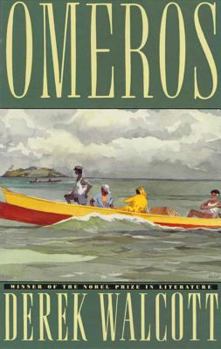Omeros
Select Format
Select Condition 
Book Overview
Omeros is the grand epic poem told in multiple chapters from Nobel Prize-winning poet and playwright Derek Walcott.
Format:Paperback
Language:English
ISBN:0374523509
ISBN13:9780374523503
Release Date:June 1992
Publisher:Farrar, Straus and Giroux
Length:336 Pages
Weight:1.00 lbs.
Dimensions:1.0" x 5.5" x 8.5"
Customer Reviews
4 ratings
Wonderful
Published by Thriftbooks.com User , 16 years ago
This richly allusive poem is an exploration of the colonial experience, primarily from the viewpoint of the dispossessed. While based in Walcott's native St. Lucia, the poem ranges across North America and Europe, and draws on a rich literary heritage. While not strictly speaking an epic by traditional standards, Omeros is epic in scope and ambition. Most of Walcott's characters, including an autobiographical narrator, are individuals in search of a home. The poem itself is an effort to reconcile both the European tradition with the experience of dispossession and enslavement. Walcott calls on Homer, Milton, Joyce, the history of St. Lucia, and many other resources to produce this impressive poem. Walcott's ability to vary his poetry and language across the whole length of the poem is impressive. Parts are intensely lyrical, others witty. The descriptive writing is often superb. A number of sequences, for example, the opening section and the dream voyage of one character to his ancestral Africa are stunning.
Epic
Published by Thriftbooks.com User , 19 years ago
Exploring the relationships between natives, tourists, and nature, Walcott moves beyond just our relationships with one another to create this modern epic. Evocative of the Iliad with its battles between Hector and Achille over the yellow-dressed Helen, Omeros moves beyond just the interactions of the natives to greater themes. There are many exciting parts to the poem: the beauty of the language, the themes, that it was only on the second time reading Omeros that I realized it rhymed, such is the seeming effortlessness with which Walcott writes. It is a modern epic for the way it is able to really explore human relationships with one another, with the trees, with people invading our indigenous societies. Walcott manages to focus on a few people in spite of the seemingly huge scope of Omeros, and this makes the book much more deeply enjoyable. I recommend it heartily.
Excellent
Published by Thriftbooks.com User , 24 years ago
An amazing poem, especially when read in an environmental context similar to St. Lucia. I attended a semester in the Bahamas, where our English class spent fifteen weeks reading and dissecting the poem. "Omeros" is stunning, elegantly written, subtle and outspoken at the same time. The mingling of Helen and Helen, of Mr. Walcott's personal history (or the history of the "phantom narrator," as we chose to call him) and that of his island are masterful. A challenging but very worthwhile read.
So rich & never full of itself
Published by Thriftbooks.com User , 25 years ago
I didn't know the work of Derek Walcott until I ran into this book. What an amazing book it is ! I used to dislike epic poems - they usually just ramble on and on, preferably made to rhyme in the correct places but in such a way that all life is taken out of the lines. This book is different & its author is no less than a genius. Sometimes I can't really grasp the meaning of a passage, but it doesn't really matter - each page in this book is so full of the most brilliant images & visions, that it almost seems like a book in itself. And although it's so impossibly rich in smells, colours & sounds, it never succumbs, thank God, to the kind of self-importance that sometimes overshadows the work of other truly great writers. Hans Wigman





